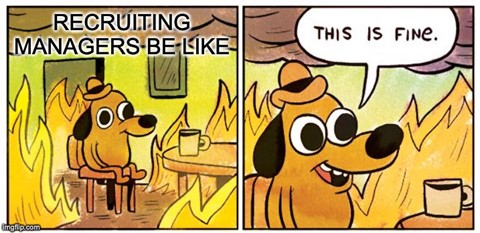At any motor carrier, recruiting professionals play one of the most vital roles within the organization, working daily to fill open driving jobs and to keep the company staffed to operate.
Despite that critical role, recruiters can be highly susceptible to burnout, given the daily stress in managing and meeting call or offer quotas and in handling the rejection inherent in the job when candidates don’t accept job offers or leads fall through.
So the primary focus of managers and HR leaders overseeing recruiters at their organization is to help manage that stress and provide the support needed for their recruiting team to effectively perform their jobs.
For the past 18 months, in the myriad of conversations the team at The National Transportation Institute has had with recruiting managers at fleets, the theme is a lot like the popular social media meme below. The phone is on fire. The desk is on fire. The cubicle is on fire. But the sentiment they verbalize is, “This is fine. We’re fine.”
To help douse those flames, here are a few coping mechanisms and strategies recruiting managers can employ to help motivate their team and ward off burnout on their team and for themselves.
To help recruiters close more offers, coach them to start calls by looking at the bigger picture and communicating expectations clearly throughout.
Work with your recruiters to identify the big picture before discussing with candidates the pillars that build a compensation package. If your fleet consistently pays drivers a robust pay and benefits package – yet that might not be reflected exclusively in a per-mile pay rate — then tell your team to explain that big picture first, rather than simply answering a driver’s question about the per-mile pay or base pay rate.
Or if you offer strong healthcare options and lots of home time, start with that broader look at your benefits package and driving jobs as part of your overall comp package.
Your team should be effectively communicating up front the total package of working at your fleet, rather than simply offering a bullet list of the compensation and benefits options.
This approach not only helps your recruiters better sell your fleet and close more deals (and thus help alleviate burnout stressors), it also pays dividends down the line in the onboarding process and during a driver’s initial months by ensuring expectations align with the job’s reality.
Remind your recruiters to focus on finding the right candidates – not just meeting quotas.
Some drivers simply aren’t the right fit for what your fleet is offering. And that’s OK. The earlier in a call that recruiters can find whether there’s alignment, the better — and the more likely your team can close more offers.
For example, a driver looking for a long-haul job and who only wants to bump docks to load and unload won’t be aligned with a flatbed job or a local food hauling job where there’s high labor involved.
So it’s important to tell your recruiters to sell the pros of the jobs you have open to the leads interested in what you’re offering. To use the local food hauling job example again: If a driver wants to be home more often and likes the idea of keeping fit with physical activity on the job – ensure your recruiters sell them on that component of your opportunities.
It’s a waste of everyone’s time — the candidate’s and your recruiter’s — if they’re having a conversation about a job where there’s not a good fit. By reducing the volume and scope of misaligned calls, you can help keep your team motivated and soothe factors that cause burnout.
Offer constant encouragement and the right motivational touches.
Recruiting at trucking fleets is effectively a sales position, so recruiting managers need to think of their position in the same way, and that means borrowing tactics from sales managers.
Give your team motivational posters, calendars, quotes, or other gifts so they’re surrounded by positive and supportive messaging. Remind them how critical their work is to the organization.
Coaching and encouragement go a long way in making your team feel supported and remaining positive through the daily ups and downs of the recruiting process.
Ensure you’re giving the team quality leads.
Upstream from your recruiting team, make sure the leads you’re generating either internally or from an external vendor are good leads.
That sounds obvious, but if your team’s consistently reporting back that leads aren’t aligned with the jobs you’re offering or they’re suddenly struggling to close deals, that’s a sign something’s amiss.
Audit your leads to make sure they’re being properly identified by geography, pay, trailer type, benefits, endorsements, and other details necessary to the jobs your fleet actually offers. And also pay attention to the campaigns you run on social media and search engines and within advertising or on job boards. Do they match what you offer? Are those campaigns generating quality leads for your recruiters?
Ensuring that your recruiting team is pursuing candidates from qualified leads shows them you and the company feel their time is valuable, improves their chances of landing driver candidates, boosts their job satisfaction, and eliminates burnout drags.
Have other suggestions for how fleet managers can help steer around burnout among recruiting staff? Let us know: info@driverwages.com



